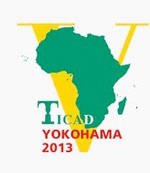






In 2011 Japan exported R34.3bn worth of goods to SA and imported goods worth R55.6bn.
Bilateral trade last year was likely to have exceeded R100bn as Japanese exports recovered from the impact of the March 2011 tsunami‚ while SA coal exports have increased substantially as all of Japan's nuclear power stations were closed down for safety checks. In 2010‚ nuclear power stations provided 30% of Japan's electricity.
Trade sources indicated that in January SA coal exports to Japan were already more than the whole of 2012. This was in part due to weather disruptions at Australian coal terminals in January.
The Japanese Foreign Ministry has put in a substantial effort to promote the Tokyo International Conference on African Development V (TICAD V)‚ which is the major conference between Japan and African countries and will once again be held in Yokohama in June.
TICAD IV‚ which was held in 2008‚ was attended by representatives from 51 African countries‚ including 41 of heads of State and had more than 3‚000 participants.
The yen weakened to its softest level in nearly three years against the US dollar on Wednesday (6 February) after the Bank of Japan's governor said he would leave before his term ended.
The yen touched 94.06 against the dollar‚ its weakest level since May 2010‚ and is now 22% more competitive than the its value in September last year‚ when the yen touched 77.12 against the US dollar.
The yen's weakening came after Bank of Japan (BoJ) Governor Masaaki Shirakawa announced that he planned to leave on 19 March‚ about three weeks before the end of his term.
His offer to resign has led to speculation that his successor would be accommodating of Prime Minister Shinzo Abe's Abeconomics‚ which aim to boost Japanese growth through aggressive fiscal and monetary stimulus.
In January the Bank of Japan said it would adopt a 2% inflation target and an unlimited asset-purchase scheme‚ that would start in 2014.
Yoshinori Tanaka of the National Policy Unit said in December that the need for platinum group metals was likely to increase as more fuel cells that use platinum as a catalyst are installed in cars and homes.
"The aim is to have 1.4m fuel cells in residences by 2020 from only 10‚000 currently and then grow this to 5.3m by 2030‚" he said. "In addition‚ the government aims to help with the construction of facilities for fuel-cell vehicles so that they can be marketed from 2015."
Takashi Morimoto‚ manager of the Panasonic Centre in Tokyo‚ said that by using the company's products now on the market or being developed‚ it was possible to reduce residential energy consumption by 65%. Much of the remaining 35% could be eliminated through the use of solar power‚ fuel cells and lithium-ion batteries.
Platinum refiner Johnson Matthey said in its Platinum 2012 Interim Review‚ that platinum demand in auto catalysts will be supported by Japanese manufacturers as vehicle output improved following the 2011 tsunami.

For more than two decades, I-Net Bridge has been one of South Africa’s preferred electronic providers of innovative solutions, data of the highest calibre, reliable platforms and excellent supporting systems. Our products include workstations, web applications and data feeds packaged with in-depth news and powerful analytical tools empowering clients to make meaningful decisions.
We pride ourselves on our wide variety of in-house skills, encompassing multiple platforms and applications. These skills enable us to not only function as a first class facility, but also design, implement and support all our client needs at a level that confirms I-Net Bridge a leader in its field.
Go to: http://www.inet.co.za